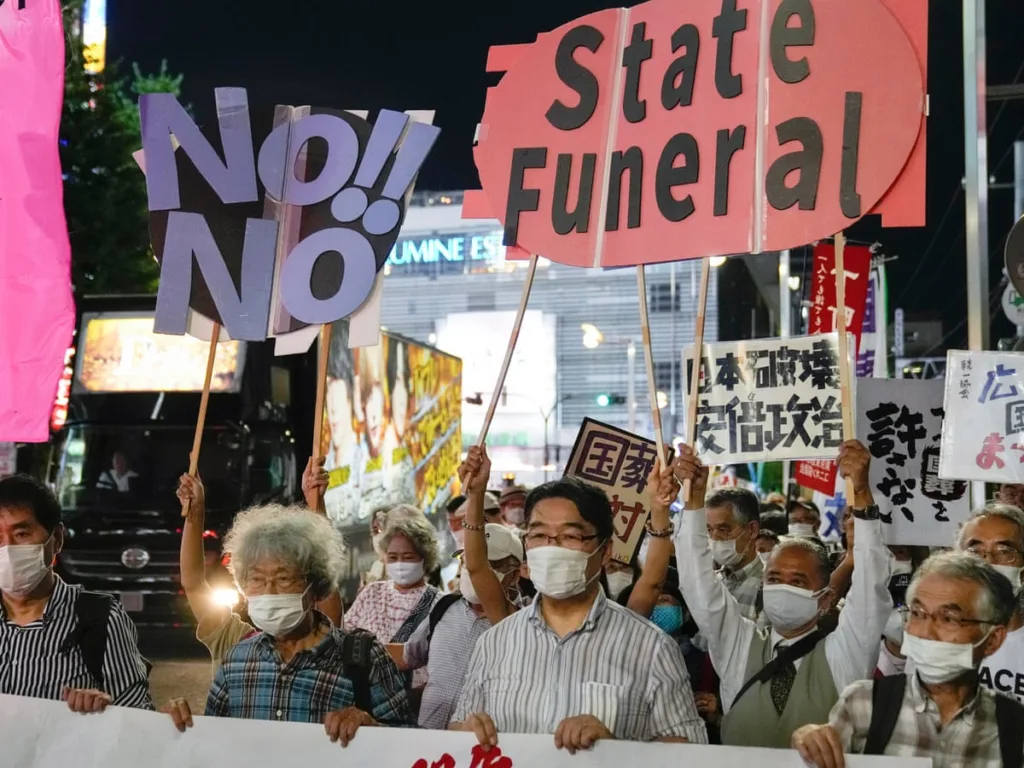Japan is known for stability and incremental change. But history shows that when shocks occur — political, corporate, or social — reforms can move surprisingly fast. Recent events, from the resignation of Suntory’s chairman to the aftermath of former Prime Minister Abe’s assassination, show how crises accelerate shifts that would otherwise take decades.
Abe’s Assassination and the Unification Church
The assassination of Shinzo Abe in July 2022 stunned the nation. The attacker said he acted out of anger that his mother had donated nearly all of the family’s money to the Unification Church (統一教会), and over the close ties he believed existed between Abe, other politicians, and the church.
That tragedy forced an unprecedented reckoning:
- A 2022 Asahi Shimbun poll found 80% of respondents believed politicians should cut ties with religious organizations.
- By late 2023, the government formally requested the court dissolve the Unification Church — a rare action under the Religious Corporations Act.
- Internal reports cited by NHK showed membership dropped by over 30% from 2022 to 2024.
What had been tolerated for decades was reformed almost overnight — a dramatic example of shock-driven change.
Suntory and the Cannabis Debate
In September 2025, Suntory’s chairman stepped down after revelations that supplements he had been linked to may have contained THC. Though the case focused on governance, it thrust CBD and cannabis into the national spotlight.
CBD is already growing in popularity, with expanding awareness of wellness and lifestyle applications. At the same time, global legalization trends have made Japanese consumers more aware of cannabis’s evolving role abroad.
Despite this, Japan remains cautious:
- The 2024 Cannabis Control Law revision legalized medical cannabis in principle, and set clear CBD/CBG/CBN rules.
- But medical THC products still haven’t entered the market.
- THC limits remain among the strictest globally — 1 ppm in foods, 10 ppm in oils.
Still, public awareness surged. According to the Ministry of Health, Japan’s legal cannabinoid market is projected to exceed ¥80 billion by 2030. Without scandal, that momentum may have taken years longer.
Crisis as Catalyst
This pattern isn’t new — Japan’s biggest reforms often follow crisis moments:
- Food safety incidents in the 2000s led to mandatory allergen labeling.
- The Olympus accounting scandal (2011) accelerated corporate governance reform.
- The 2011 Fukushima disaster reshaped national energy and disaster policy.
What This Means for Business
For businesses in Japan, the lesson is clear: gradual change is the norm — until it isn’t. When scandal, disaster, or public backlash occurs, what was once untouchable may suddenly shift.
Companies that can spot these moments — and act with speed and cultural sensitivity — often gain an edge. Because in Japan, real reform often comes not through lobbying, but through the window that opens right after shock.

